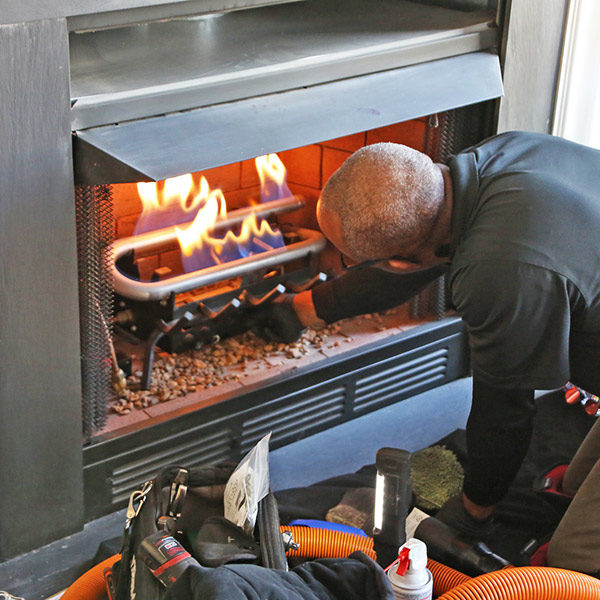Introduction to Gas Fire Systems
Gas fires have become a popular choice in homes due to their efficiency, ease of use, and ability to provide comfortable warmth without the mess associated with traditional wood-burning fireplaces. They come in various styles and designs, from classic to contemporary, making them suitable for any home decor. However, like any appliance, gas fires require regular maintenance and occasional repairs to ensure they operate safely and efficiently.
Importance of Regular Maintenance
Regular maintenance of gas fires is crucial for several reasons:
– Safety: Faulty gas fires can lead to dangerous situations, including gas leaks and carbon monoxide poisoning.
– Efficiency: A well-maintained gas fire burns more efficiently, providing better heat output while using less fuel.
– Longevity: Regular checks and cleaning can extend the lifespan of your gas fire system.
– Cost Savings: Preventative maintenance can often catch small problems before they become costly repairs.
The importance of regular maintenance cannot be overstated. It ensures that your gas fire is safe for use and performs optimally throughout its lifespan.
Key Components of Gas Fire Systems
Understanding the key components of your gas fire system can help you better grasp what needs regular attention during maintenance:
– Burner: This is where the gas mixes with air and ignites to produce a flame.
– Pilot Light/Ignition System: Responsible for igniting the gas when you turn on your fire.
– Thermocouple: A safety device that detects whether the pilot light is lit and controls the gas flow accordingly.
– Flue/Chimney: Allows combustion gases to exit the home safely.
– Gas Valve: Controls the flow of gas to the burner.
– Heat Exchanger: Transmits heat from the burning gas into the room.
Each component plays a critical role in the safe operation of your gas fire, making their upkeep essential.
Common Issues in Gas Fires
Even with meticulous care, issues can arise with gas fires. Some common problems include:
– Pilot Light Problems: The pilot light may not stay lit due to a faulty thermocouple or blocked pilot tube.
– Burner Issues: Irregular flames or no flame at all could indicate a blocked burner or insufficient gas supply.
– Carbon Monoxide Leaks: Poor ventilation or cracked heat exchangers can lead to dangerous leaks.
– Strange Noises: Unusual sounds might be due to air in the gas line or loose components.
Recognizing these issues early can prevent dangerous situations and costly repairs.
Professional vs DIY Maintenance
While some homeowners may prefer to perform basic maintenance tasks themselves, there are distinct advantages to hiring professionals like Plumbing Force:
Professional Maintenance Advantages
– Expertise: Professionals have extensive training and experience with various models and brands.
– Thoroughness: They conduct comprehensive inspections that might overlook DIY efforts.
– Safety Assurance: Professionals adhere strictly to safety standards, reducing risks associated with improper handling.
DIY Maintenance Tasks
Homeowners can undertake certain minor tasks, such as:
– Cleaning visible dust from glass panels and decorative logs.
– Checking batteries in remote controls or thermostats.
However, more complex tasks should always be left to professionals.
Steps for Routine Maintenance
Routine maintenance involves several steps that ensure your system functions correctly:
- Inspect Exterior Components:
– Check for visible damage or wear on glass panels.
– Ensure that venting systems are clear from obstructions outside the home.
- Clean Interior Parts:
– Remove dust from burners using a soft brush.
– Clean decorative logs gently without repositioning them incorrectly.
- Check Pilot Light Functionality:
– Observe if it stays lit consistently when turned on.
- Test Thermocouple and Gas Valves:
– Ensure these safety devices operate correctly by turning off/on multiple times.
- Assess Heat Output Efficiency:
– Monitor room temperature changes compared with energy consumption rates over time.
By following these steps regularly, you maintain optimal performance levels while minimizing potential risks associated with neglecting routine checks.
When to Call a Professional
It’s crucial not only knowing how but also when it’s time for professional intervention:
– If you smell gas near your appliance—this indicates an immediate emergency requiring professional attention.
– Repeated pilot light failures despite attempts at relighting suggest deeper mechanical faults needing expert diagnosis.
– Strange noises persist even after cleaning—these could indicate serious internal issues beyond basic troubleshooting capabilities
Recognizing limits within one’s technical abilities helps prevent exacerbating existing problems while ensuring prompt resolution through skilled intervention services available within local areas like those provided by Plumbing Force gas fire repair experts who understand specific regional regulations affecting operational standards applicable across different jurisdictions nationwide today!
Safety Tips for Gas Fire Owners
Owning a gas fire comes with responsibilities centered around safety:
– Install Carbon Monoxide Detectors: Place detectors near sleeping areas as well as close proximity areas surrounding fireplaces themselves; test monthly replacing batteries annually ensuring proper functionality remains intact throughout year-round usage cycles!
– Regular Flue Inspections: Have chimneys inspected annually by certified professionals capable identifying potential blockages preventing adequate ventilation pathways allowing hazardous fumes escape safely outside home environments effectively mitigating risks posed towards occupants therein residing within premises themselves efficiently enough without compromising overall quality life experiences enjoyed therein daily basis too!
These measures greatly enhance household security against unforeseen dangers arising unexpectedly otherwise potentially jeopardizing welfare those living therein under circumstances beyond their control otherwise unanticipatedly arising suddenly without warning altogether sometimes!
Industry Standards and Regulations
Adhering strictly industry standards regulations ensures compliance legal requirements governing safe operations:
National Standards
Organizations like Health & Safety Executive (HSE) provide guidelines ensuring installations meet necessary criteria concerning appliance setup maintenance procedures entailing specific instructions followed meticulously avoiding potential infractions resulting penalties levied upon non-compliant parties involved therein directly indirectly affected thereby consequentially nonetheless!


